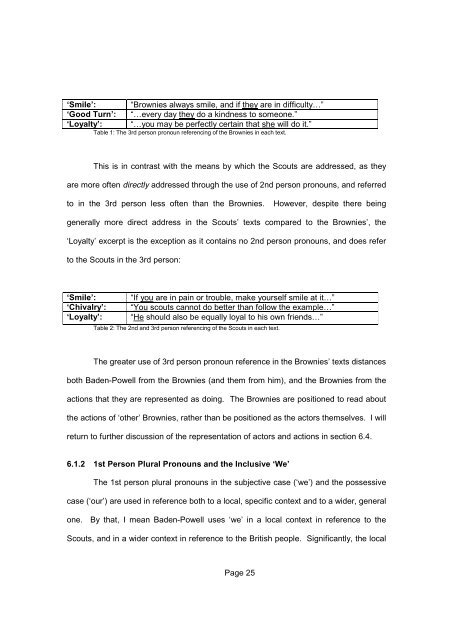A Discussion of the Representation of Masculinity and Femininity in ...
A Discussion of the Representation of Masculinity and Femininity in ...
A Discussion of the Representation of Masculinity and Femininity in ...
You also want an ePaper? Increase the reach of your titles
YUMPU automatically turns print PDFs into web optimized ePapers that Google loves.
‘Smile’: “Brownies always smile, <strong>and</strong> if <strong>the</strong>y are <strong>in</strong> difficulty…”<br />
‘Good Turn’: “…every day <strong>the</strong>y doak<strong>in</strong>dnesstosomeone.”<br />
‘Loyalty’: “…you may be perfectly certa<strong>in</strong> that she will do it.”<br />
Table 1: The 3rd person pronoun referenc<strong>in</strong>g <strong>of</strong> <strong>the</strong> Brownies <strong>in</strong> each text.<br />
This is <strong>in</strong> contrast with <strong>the</strong> means by which <strong>the</strong> Scouts are addressed, as <strong>the</strong>y<br />
are more <strong>of</strong>ten directly addressed through <strong>the</strong> use <strong>of</strong> 2nd person pronouns, <strong>and</strong> referred<br />
to <strong>in</strong> <strong>the</strong> 3rd person less <strong>of</strong>ten than <strong>the</strong> Brownies. However, despite <strong>the</strong>re be<strong>in</strong>g<br />
generally more direct address <strong>in</strong> <strong>the</strong> Scouts’ texts compared to <strong>the</strong> Brownies’, <strong>the</strong><br />
‘Loyalty’ excerpt is <strong>the</strong> exception as it conta<strong>in</strong>s no 2nd person pronouns, <strong>and</strong> does refer<br />
to <strong>the</strong> Scouts <strong>in</strong> <strong>the</strong> 3rd person:<br />
‘Smile’: “If you are <strong>in</strong> pa<strong>in</strong> or trouble, make yourself smile at it…”<br />
‘Chivalry’: “You scouts cannot do better than follow <strong>the</strong> example…”<br />
‘Loyalty’: “He should also be equally loyal to his own friends…”<br />
Table 2: The 2nd <strong>and</strong> 3rd person referenc<strong>in</strong>g <strong>of</strong> <strong>the</strong> Scouts <strong>in</strong> each text.<br />
The greater use <strong>of</strong> 3rd person pronoun reference <strong>in</strong> <strong>the</strong> Brownies’ texts distances<br />
both Baden-Powell from <strong>the</strong> Brownies (<strong>and</strong> <strong>the</strong>m from him), <strong>and</strong> <strong>the</strong> Brownies from <strong>the</strong><br />
actions that <strong>the</strong>y are represented as do<strong>in</strong>g. The Brownies are positioned to read about<br />
<strong>the</strong> actions <strong>of</strong> ‘o<strong>the</strong>r’ Brownies, ra<strong>the</strong>r than be positioned as <strong>the</strong> actors <strong>the</strong>mselves. I will<br />
return to fur<strong>the</strong>r discussion <strong>of</strong> <strong>the</strong> representation <strong>of</strong> actors <strong>and</strong> actions <strong>in</strong> section 6.4.<br />
6.1.2 1st Person Plural Pronouns <strong>and</strong> <strong>the</strong> Inclusive ‘We’<br />
The 1st person plural pronouns <strong>in</strong> <strong>the</strong> subjective case (‘we’) <strong>and</strong> <strong>the</strong> possessive<br />
case (‘our’) are used <strong>in</strong> reference both to a local, specific context <strong>and</strong> to a wider, general<br />
one. By that, I mean Baden-Powell uses ‘we’ <strong>in</strong> a local context <strong>in</strong> reference to <strong>the</strong><br />
Scouts, <strong>and</strong> <strong>in</strong> a wider context <strong>in</strong> reference to <strong>the</strong> British people. Significantly, <strong>the</strong> local<br />
Page 25

















